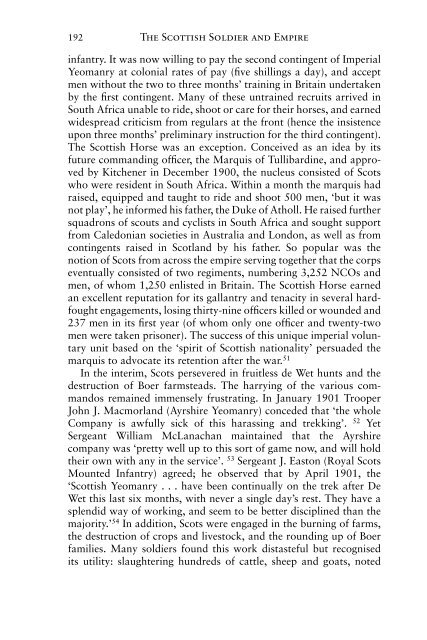The Scottish soldier and Empire, 1854-1902 - Reenactor.ru
The Scottish soldier and Empire, 1854-1902 - Reenactor.ru
The Scottish soldier and Empire, 1854-1902 - Reenactor.ru
You also want an ePaper? Increase the reach of your titles
YUMPU automatically turns print PDFs into web optimized ePapers that Google loves.
192 <strong>The</strong> <strong>Scottish</strong> Soldier <strong>and</strong> <strong>Empire</strong><br />
infantry. It was now willing to pay the second contingent of Imperial<br />
Yeomanry at colonial rates of pay (five shillings a day), <strong>and</strong> accept<br />
men without the two to three months’ training in Britain undertaken<br />
by the first contingent. Many of these untrained rec<strong>ru</strong>its arrived in<br />
South Africa unable to ride, shoot or care for their horses, <strong>and</strong> earned<br />
widespread criticism from regulars at the front (hence the insistence<br />
upon three months’ preliminary inst<strong>ru</strong>ction for the third contingent).<br />
<strong>The</strong> <strong>Scottish</strong> Horse was an exception. Conceived as an idea by its<br />
future comm<strong>and</strong>ing officer, the Marquis of Tullibardine, <strong>and</strong> approved<br />
by Kitchener in December 1900, the nucleus consisted of Scots<br />
who were resident in South Africa. Within a month the marquis had<br />
raised, equipped <strong>and</strong> taught to ride <strong>and</strong> shoot 500 men, ‘but it was<br />
not play’, he informed his father, the Duke of Atholl. He raised further<br />
squadrons of scouts <strong>and</strong> cyclists in South Africa <strong>and</strong> sought support<br />
from Caledonian societies in Australia <strong>and</strong> London, as well as from<br />
contingents raised in Scotl<strong>and</strong> by his father. So popular was the<br />
notion of Scots from across the empire serving together that the corps<br />
eventually consisted of two regiments, numbering 3,252 NCOs <strong>and</strong><br />
men, of whom 1,250 enlisted in Britain. <strong>The</strong> <strong>Scottish</strong> Horse earned<br />
an excellent reputation for its gallantry <strong>and</strong> tenacity in several hardfought<br />
engagements, losing thirty-nine officers killed or wounded <strong>and</strong><br />
237 men in its first year (of whom only one officer <strong>and</strong> twenty-two<br />
men were taken prisoner). <strong>The</strong> success of this unique imperial voluntary<br />
unit based on the ‘spirit of <strong>Scottish</strong> nationality’ persuaded the<br />
marquis to advocate its retention after the war. 51<br />
In the interim, Scots persevered in f<strong>ru</strong>itless de Wet hunts <strong>and</strong> the<br />
dest<strong>ru</strong>ction of Boer farmsteads. <strong>The</strong> harrying of the various comm<strong>and</strong>os<br />
remained immensely f<strong>ru</strong>strating. In January 1901 Trooper<br />
John J. Macmorl<strong>and</strong> (Ayrshire Yeomanry) conceded that ‘the whole<br />
Company is awfully sick of this harassing <strong>and</strong> trekking’. 52 Yet<br />
Sergeant William McLanachan maintained that the Ayrshire<br />
company was ‘pretty well up to this sort of game now, <strong>and</strong> will hold<br />
their own with any in the service’. 53 Sergeant J. Easton (Royal Scots<br />
Mounted Infantry) agreed; he observed that by April 1901, the<br />
‘<strong>Scottish</strong> Yeomanry . . . have been continually on the trek after De<br />
Wet this last six months, with never a single day’s rest. <strong>The</strong>y have a<br />
splendid way of working, <strong>and</strong> seem to be better disciplined than the<br />
majority.’ 54 In addition, Scots were engaged in the burning of farms,<br />
the dest<strong>ru</strong>ction of crops <strong>and</strong> livestock, <strong>and</strong> the rounding up of Boer<br />
families. Many <strong>soldier</strong>s found this work distasteful but recognised<br />
its utility: slaughtering hundreds of cattle, sheep <strong>and</strong> goats, noted

















